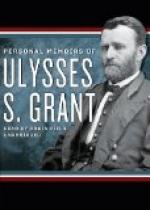A week or two before leaving Corpus Christi on this trip, I had been promoted from brevet second-lieutenant, 4th infantry, to full second-lieutenant, 7th infantry. Frank Gardner,(1) of the 7th, was promoted to the 4th in the same orders. We immediately made application to be transferred, so as to get back to our old regiments. On my return, I found that our application had been approved at Washington. While in the 7th infantry I was in the company of Captain Holmes, afterwards a Lieutenant-general in the Confederate army. I never came in contact with him in the war of the Rebellion, nor did he render any very conspicuous service in his high rank. My transfer carried me to the company of Captain McCall, who resigned from the army after the Mexican war and settled in Philadelphia. He was prompt, however, to volunteer when the rebellion broke out, and soon rose to the rank of major-general in the Union army. I was not fortunate enough to meet him after he resigned. In the old army he was esteemed very highly as a soldier and gentleman. Our relations were always most pleasant.
The preparations at Corpus Christi for an advance progressed as rapidly in the absence of some twenty or more lieutenants as if we had been there. The principal business consisted in securing mules, and getting them broken to harness. The process was slow but amusing. The animals sold to the government were all young and unbroken, even to the saddle, and were quite as wild as the wild horses of the prairie. Usually a number would be brought in by a company of Mexicans, partners in the delivery. The mules were first driven into a stockade, called a corral, inclosing an acre or more of ground. The Mexicans,—who were all experienced in throwing the lasso,—would go into the corral on horseback, with their lassos attached to the pommels of their saddles. Soldiers detailed as teamsters and black smiths would also enter the corral, the former with ropes to serve as halters, the latter with branding irons and a fire to keep the irons heated. A lasso was then thrown over the neck of a mule, when he would immediately go to the length of his tether, first one end, then the




